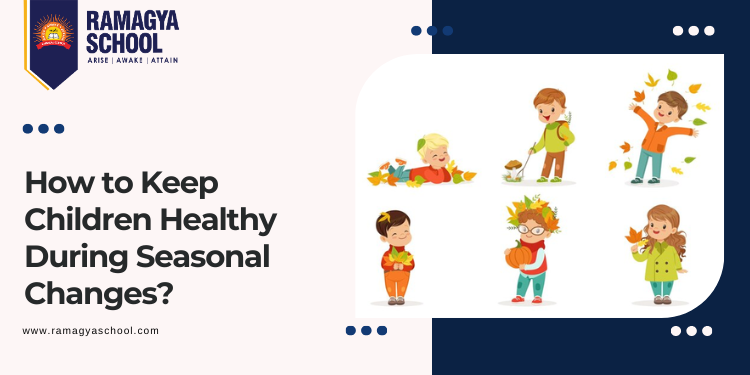The changing seasons can make children more susceptible to getting sick. It can be from hot to cold, or from rainy to sunny. The bodies of children require time to adjust. This is the time when diseases like coughs, colds, and fevers are not uncommon. As parents, we need to ensure that our kids stay healthy and happy no matter the season.
Here are some easy and practical ways to protect your child’s health during these times.
Health Tips for Children During Seasonal Changes
Children’s immunity may weaken in the course of seasonal changes, which makes them more susceptible to illnesses. Here are some easy health guidelines:
- Wash Hands Regularly: Make sure to wash your hands regularly. Teach the child how to clean their hands frequently, particularly before eating, and after playing outside.
- Stay Hydrated: Even when the weather is cold, ensure your child is drinking enough fluids all day long.
- Dress Appropriately: Dress your child in accordance with the season. In colder seasons, layer their clothing and you can switch the clothes when needed.
- Maintain your Hygiene: Make sure your child’s surroundings like their bedroom as well as their play area are free of germs and clean.
These health tips for children can help in keeping them safe through the change of seasons.
Understanding Nutritional Needs for Children
A healthy diet is among the most effective ways to ensure your child’s health. Your diet should be full of vital nutrients in order to develop an immune system that is strong. Here’s the main points to consider:
- Protein-Rich Food Items: Foods such as eggs as well as fish, lentils and nuts are excellent for children who are growing.
- Vegetables and Fruits: Include seasonal vegetables and fruits in your child’s diet. They are a great source of minerals and vitamins.
- Dairy Products: Cheese, milk and yogurt are rich in calcium for strong bones as well as teeth.
- Healthy Snacks: Replace your junk food intake with healthy snacks such as fruit slices, roasting nuts, or homemade Granola bars.
Concentrating on the nutritional needs of children during the seasons can keep them active and enthusiastic.
Health Tips for Winter Season
The winter season can be a challenge for children’s health since it frequently causes flu and colds. Take note of these healthy tips for the winter months* to protect your child:
- Keep them Warm: Be sure that your child is wearing warm clothes, including scarfs, gloves and caps, particularly when out in the cold.
- Boost Immunity: Include nuts or citrus fruits & honey in their diets to boost their immunity.
- Moisturize their Face: The winter weather can make their skin dry. Use a gentle moisturizer to keep your child’s skin moisturized.
- Warm Drinks: Serve warm soups, milk, or herbal teas to keep their body warm from the inside.
- Encourage Activity: Even in the winter months, ensure your child’s activity levels are maintained with activities indoors or with gentle outdoor activities.
These health tips for winter season will help safeguard your child from winter-related illnesses.
Encourage Healthy Habits
Instilling healthy habits in children can make a huge difference. The best habits to promote include:
- Regular Sleeping: Make sure your child gets sufficient sleep each night. It will help their body to recover and get stronger.
- Stay Active: Keep active even during the colder months or rainy days, help your children engage in simple games or exercises to keep them active.
- Avoid Junk Food: Sugar and fried food can disturb our immune system. Encourage homemade meals instead.
- Teach Them to Cover Their Mouth: Remind your child to cover their mouths using their elbows whenever they sneeze or cough, to avoid spreading germs.
Making these changes along with the following health tips for winter season will ensure your child’s overall health.
Prepare for Seasonal Allergies
There are children who experience allergies when seasons change, for example scratchy skin, sneezing or eyes that water. Here’s how to handle allergies:
- Recognize Triggers: Be aware of the things that trigger allergies, such as dust or pollen. Attempt to limit exposure!
- Use a Humidifier: In the winter months, a humidifier will keep the air moist, and also prevent dry throats and dry noses.
- Regular Check-Ups: If the allergies are serious seek out a pediatrician guidance or prescription.
A Balanced Routine
A routine that is well-planned can help children adjust to seasonal changes with ease. Here’s what you should include:
- Healthy Meals: Stick to a balanced diet that meets the nutritional requirements of children.
- Hydration: Throughout the winter months, make sure that your children drink plenty of water. Warm water is a great alternative during the cold winter seasons.
- Regular Check-Ups: Visit your doctor regularly for health checks to make sure everything is working as it should.
Conclusion
The changes that come with the seasons can be difficult But with the right treatment you can ensure that your child is healthy and content. Be aware of their dietary needs for children. Follow simple health guidelines for children, and provide extra care during colder seasons by following these health tips for winter season. A little focus on their eating habits, diet as well as hygiene, can have all the difference.
If you take these simple steps, you can make sure your child’s health and fitness remains free of illness, regardless of time of year!

